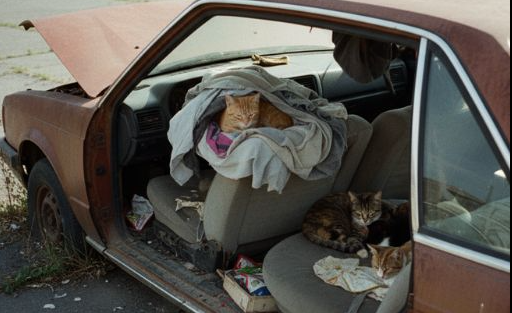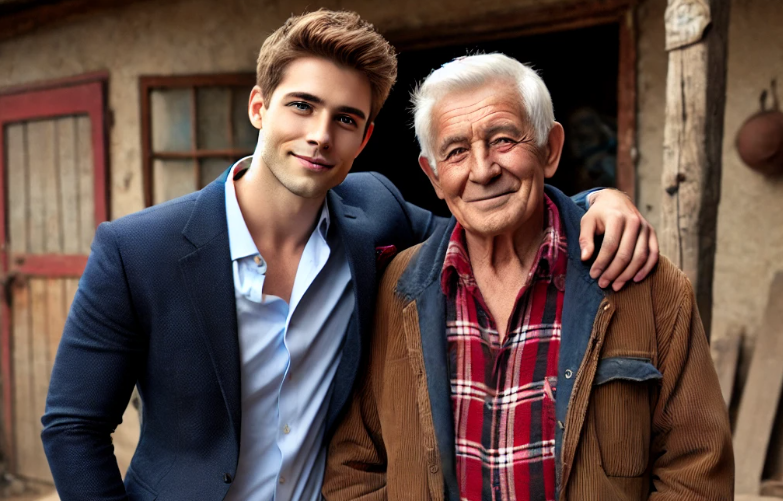Tucked behind the aging flooring warehouse, an old car sits—rusted, without wheels, overtaken by creeping weeds. Most passersby barely glance its way. Yet, pause for a moment, and you’ll notice the back seat stirs with life.
Blankets. Bowls. Fur.
Cats. At least eight of them.
No one claims ownership. No one brings them food. Still, they thrive.
Some mornings, a freshly opened can appears on the curb. A bag of kibble, half-full, rests beneath the passenger seat. A towel, neatly folded, always drapes the dashboard, as if someone tucks them in each night.
I asked the clerk at the nearby mart. He nodded and said, “Oh, the cat car. It’s been there for years.”
I spoke to the maintenance worker. He shrugged, “They’re tidy cats. They don’t cause trouble.”
I approached the woman from the church pantry. She exhaled softly and said, “The cats aren’t my concern. It’s who they’re waiting for.”
Her words lingered.
She gazed down the street, as if expecting someone to appear at any moment.
That night, her words echoed in my mind. Who were the cats waiting for? Why leave them in a derelict car? Why feed them but stay hidden?
The next day, I returned to the warehouse. The air carried the scent of damp pavement and rust. The car sat unchanged, its faded blue paint peeling under layers of corrosion. Cats peered from the windows—one stretched lazily across the back seat, another perched on the hood, watching over the rest.
I knelt and murmured, “Who looks after you?”
The cats blinked, tails swaying, their eyes catching the dim light.
That evening, I left a can of tuna by the curb. By morning, it was gone—spotless, as if carefully cleaned and taken away.
It became a habit. Every few days, I’d leave food, and each time, it disappeared by dawn. The cats grew familiar with me. They meowed gently when I approached, brushing against the cracked door frame, gazing with steady, trusting eyes.
Yet, I never saw the other caretaker.
Until one night.
It was late, close to midnight. Restless, I walked to clear my thoughts. The street was still, save for the faint hum of a distant truck. As I neared the warehouse, I saw a shadow move. A small figure crouched by the car, a faint flashlight glowing.
I stopped, hidden behind a stack of pallets. The figure placed bowls of food from a bag, gently patting each cat. The cats knew this person—they purred, weaving around their legs like kin.
The figure adjusted the dashboard towel, then slipped a folded paper under the wiper blade. They stood for a long moment, staring at the car, before vanishing into the alley.
I didn’t follow. Their slow, burdened steps—each one heavy with unseen weight—held me back.
The next morning, the note remained.
Something urged me to take it. In trembling handwriting, it read:
“I’ll return when I can. Please care for them if you see this.”
No name. No details. Only that.
For days, the note haunted me. Who wrote it? Why leave? Were they ill? In hiding? Fleeing something?
Then, one Saturday, I saw her. It was daylight, and I was biking past the warehouse. An older woman, perhaps in her late sixties, knelt by the car in a worn denim jacket, whispering to the cats.
I slowed but didn’t stop. She looked up, our eyes meeting briefly. Hers were weary yet sharp, carrying the weight of a life endured.
I wanted to speak, but she turned and slipped into the warehouse lot, gone.
For weeks, I tried to find her again. I left notes under the wiper: “I see you care for them. Can we talk?” No replies came.
Still, the cats stayed healthy. Someone—maybe both of us—kept them fed.
Then came the twist.
One rainy night, flashing lights caught my eye. Two police cars idled near the warehouse. Officers swept the area with flashlights. The cats huddled inside the car, eyes wide. I approached, blending in as a curious onlooker.
One officer muttered, “She’s back. Neighbors saw her.”
The other sighed, “She’s not a threat. Just stubborn. Poor woman’s been like this since her son passed.”
That stopped me cold.
Her son?
I lingered until the officers left, finding no one. Only wet footprints remained.
Later, I pieced together the story from town talk. Her name was Marta. Years ago, her son died in a car accident near the warehouse. That very car, now home to cats, had been his.
After his death, Marta couldn’t let it go. She hauled it behind the warehouse, safe from towing. Then, for reasons unclear, cats began to gather—strays, lost, abandoned—all drawn to the car.
Marta started feeding them, seeing them as a sign. Some said she believed her son’s spirit lingered in them. Others thought she needed something to nurture, to fill the void he left.
Whatever the reason, she kept returning, despite police, new warehouse owners, or neighbor complaints.
The church woman’s sigh now made sense. “It’s not the cats I worry about. It’s who they’re waiting for.”
They waited for Marta.
One afternoon, I found her again, sitting on a crate, brushing a cat with an old comb. Her jacket was damp from drizzle, but she seemed unfazed.
I approached cautiously. “Hi,” I said softly. “I’ve seen you here.”
She eyed me warily. “Plenty of folks pass by.”
“Not many bring food.”
Her gaze softened. She nodded. “You’re the tuna guy.”
I smiled. “Guilty.”
She studied me, then patted the crate beside her. I sat.
Cats moved around us, tails brushing my hands, eyes trusting. Marta stroked the one in her lap. “They keep me going,” she whispered.
I stayed silent.
She continued, voice soft. “My boy loved animals. Always brought home strays. When he… when he was gone, I thought I’d follow. Then cats filled his car. Like they knew. Like he sent them. So I stayed.”
Her words struck deep.
For weeks, I visited often. Sometimes we sat quietly, watching the cats. Other times, she shared stories of her son—how he repaired bikes, fed the neighbor’s dog, hated tardiness.
Police came now and then, but they never pressed too hard. Perhaps they understood. Perhaps they felt for her.
Then, one morning, the car was empty. No cats. No blankets. Just a hollow metal frame.
Panic hit. I rushed to the church pantry. The woman there gave a sad smile. “Animal rescue came. Marta agreed. She said it was time.”
“Time for what?” I asked.
“She’s moving to her sister’s. Said she couldn’t keep living like this. Asked us to thank the boy who brought tuna.”
It took a moment to realize she meant me.
That evening, I returned to the warehouse. The car seemed smaller without the cats. Lonely. I sat on the hood, rain soaking my jacket, thinking of Marta.
I never saw her again. Weeks later, I heard the shelter adopted out most of the cats. Some went in pairs, others to families with children.
And I understood—Marta didn’t just want them alive. She wanted them safe, loved, moving forward, even when she couldn’t for years.
That’s when it hit me. We cling to broken things because they tie us to those we’ve lost. Letting go doesn’t diminish love. It sets it free, like those cats finding new homes.
Now, passing the empty lot, I don’t see only rust. I see quiet strength—the kind it takes to endure loss, to nurture life when you’re barely holding on, to release when the time comes.
If you pass a forgotten spot in your town—a car, a corner, a place with stories—look closely. You might find a tale of resilience, reminding you what it means to persevere, to care, to let go.
Because sometimes the smallest lives—those curled in a rusted car’s back seat—teach the greatest lessons.
If this story moved you, share it with someone who might need a reminder of love, loss, and moving on. And don’t forget to like it—it helps stories like this reach more hearts.




